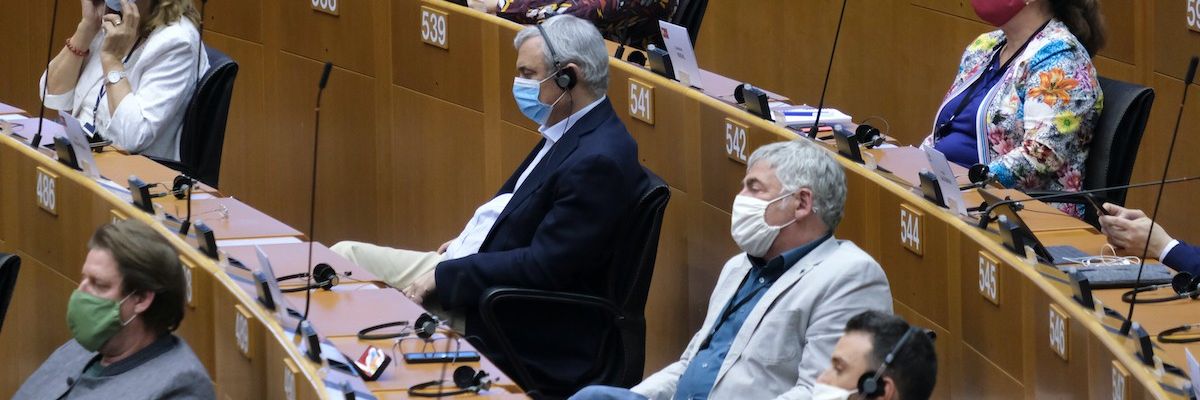Even as President Joe Biden insisted at the United Nations this week that he seeks cooperation with potential foreign rivals, most Europeans believe that the United States is already engaged in a new “cold war” with China and Russia, they feel their own nations are not involved, according to a new survey of respondents in 12 EU countries released Tuesday by the European Council on Foreign Relations.
However, they see their own European institutions, notably the European Union, as somewhat more invested in aligning the continent with Washington’s perceived interest in such a conflict, according to the report which warned that there appears to be a growing gap between the EU’s national publics and the EU leadership, as well as with the United States itself.
“If this new polling has captured a lasting trend, it reveals that European publics are not ready to see the growing tensions with China and Russia as a new Cold War,” said Ivan Krastev, co-author of the analysis that accompanied the new survey and Chair for Liberal Strategies of the European Council. “So far, it is only European institutions rather than European publics that are ready to see the world of tomorrow as a growing system of competition between democracy and authoritarianism,” he added.
The findings may spell more problems for NATO, the military alliance that unites the United States with European nations and appears to confirm a trend documented by previous ECFR surveys over the last several years. Efforts by “foreign policymakers in Washington and Brussels to prepare for an ‘all of society’ generational struggle against autocracies in Beijing and Moscow…could well come up short when they discover that they do not have a societal consensus behind them,” the report warned.
“On its own, this gap in views of geopolitics is not necessarily a sign of the declining importance of the Western alliance,” it went on. “But it is a signal that, should a moment of crisis come, Brussels could be accused (by its national publics) of being an American voice in Europe rather than a European voice in the world,” it concluded.
The survey, which was conducted online and through telephone interviews in late May and early June, questioned just over 16,000 respondents in 12 EU nations — Austria, Bulgaria, Denmark, France, Germany, Hungary, Italy, Netherlands, Poland, Portugal, Spain, and Sweden — that together comprise about 80 percent of the bloc’s total population.
The new survey found that 60 percent of Europeans believe a new “cold war” is already underway between the United States and China and a somewhat lesser number — 59 percent — believe the same applies to relations between Washington and Moscow.
But relatively few Europeans see their own country as similarly engaged. Only 15 percent of European respondents said they believe their own country is in conflict with China, while 59 percent disagreed. Respondents in Hungary, Bulgaria, Portugal, Austria, and Italy were most inclined to deny that China posed a threat to their countries.
Russia, on the other hand, appeared threatening to somewhat more respondents. One in four respondents continent-wide, led by Polish (44 percent, French 35 percent, and Sweden (32 percent) respondents said they considered that their country to be in a “cold war” with Moscow, while 46 percent continent-wide disagreed.
However, respondents said they believed that the EU as an institution was more hawkish toward both China and Russia than their own countries. Thus, in contrast to the mere 15 percent of respondents who said they believed their own countries were in a “cold war” with China, more than twice that percentage (31 percent) said they considered the EU to be in conflict with Beijing. A slight plurality of 34 percent said they considered that the EU was not in conflict with China; the remainder expressed no opinion.
Similarly, the perception that the EU was engaged in a “cold war” with Russia than their own countries was substantially more widespread. A plurality of 44 percent expressed that view.
“National governments continue to disagree about the EU’s policy on China or Russia but, in the eyes of people in every surveyed EU member state (apart from Poland), Brussels seems to be understood as the foreign policy hawk when it comes to dealing with China and Russia,” according to the analysis. “The new West is a coalition between Washington and Brussels rather than between the U.S. and Europe.” In short, Brussels’ relative hawkishness runs against the grain of popular opinion in Europe.
“The European public thinks there is a new cold war, but they don’t want to have anything to do with it,” noted the report’s co-author, Mark Leonard. “Our polling reveals that a ‘cold war’ framing risks alienating European voters.”
“Unlike during the first cold war, they do not see an immediate existential threat to Europe’s neighborhood or a sense of ideological cohesion within the free world,” he added. “Politicians can no longer rely on tensions with Russia and China to convince the electorate of the value of a strong Atlantic alliance. Instead, they need to make the case from European interests, showing how a rebalanced alliance can empower and restore sovereignty to European citizens in a dangerous world.”















